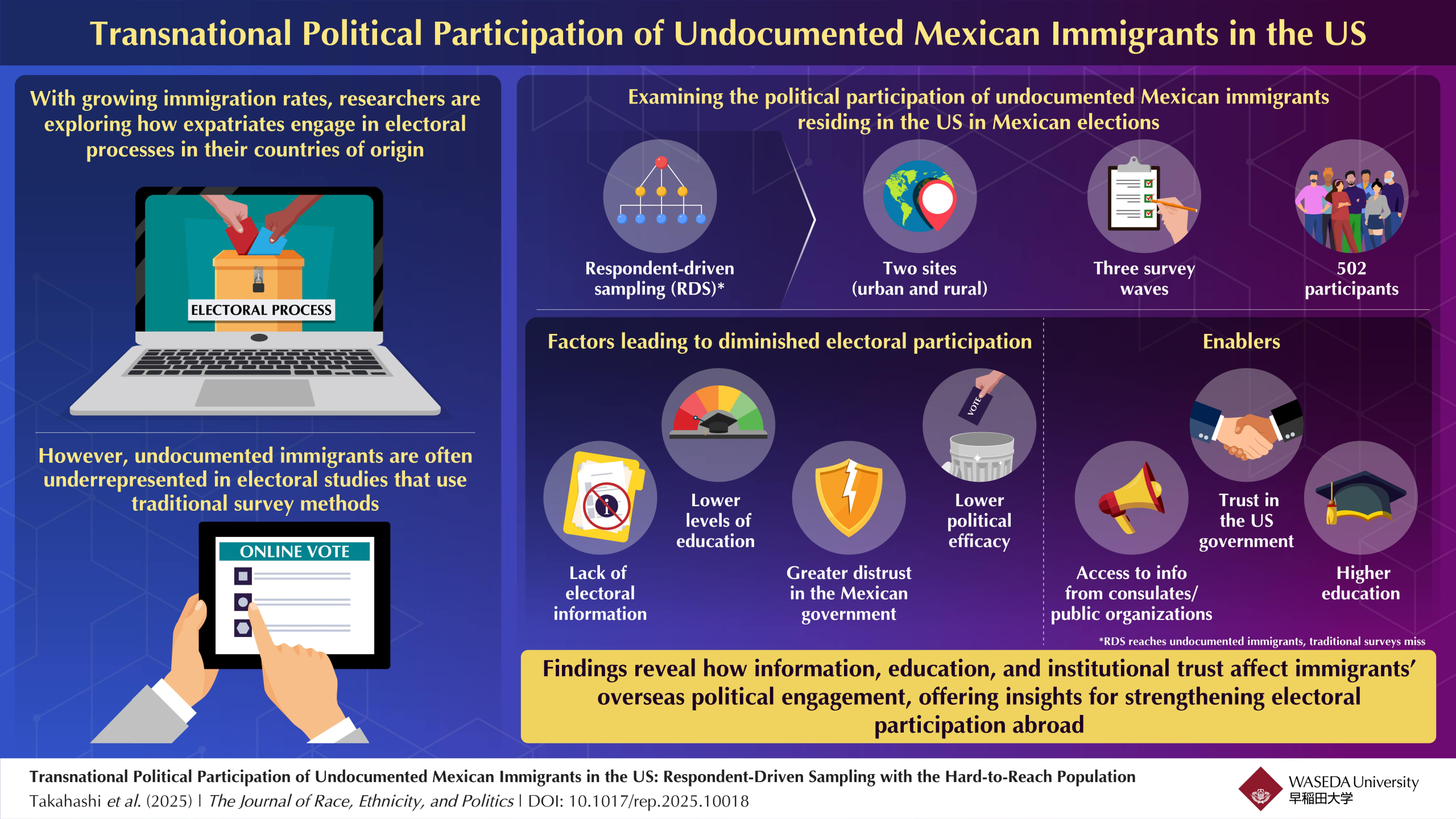Transnational Electoral Participation of Undocumented Mexican Immigrants in the US
Fri, Oct 10, 2025-
Tags
Transnational Electoral Participation of Undocumented Mexican Immigrants in the US
New study investigates the engagement of undocumented Mexican immigrants in the US in external voting in Mexican elections
Although there is a growing scholarly interest in studying the engagement of expatriates in external voting in their countries of origin, conventional survey methods often fall short of accurately representing the perceptions and political participation of undocumented immigrants. Remedying this gap, researchers from Japan used respondent-driven sampling to assess the factors that influence the political participation of undocumented Mexican immigrants residing in the US in Mexican elections.

The global increase in migration—with approximately 3.6% of the global population living as expatriates—has resulted in many countries extending external voting rights to their overseas citizens. This has prompted scholarly interest in understanding the electoral participation of immigrants in their countries of origin. However, most research has focused on the factors that drive the provision of external voting rights to expatriates rather than the extent to which these rights are exercised. Furthermore, prior research has largely overlooked the political behavior of undocumented immigrants, who constitute a significant share of the immigrant population, especially in the United States (US). Conventional research, using traditional survey methods, does not adequately include undocumented immigrants, resulting in biased findings.
To address these shortcomings, a team of researchers led by Associate Professor Yuriko Takahashi of Waseda University employed a novel methodology based on respondent-driven sampling (RDS) to conduct a large-scale survey in Illinois to assess the engagement of undocumented Mexicans living in the US with Mexico’s overseas voting system. “Our RDS-based survey provides a unique opportunity to gain insights into the political attitudes of undocumented immigrants by enabling the creation of a representative sample of this hard-to-reach population without a sampling frame. This approach, therefore, leads to the generation of unbiased results,” explains Takahashi. The results of this novel study, which included Associate Professor Jaehyun Song, Kansai University, and Professor Takeshi Iida, Doshisha University, were published on 05 September 2025 in The Journal of Race, Ethnicity, and Politics.
In the first stage, the researchers conducted personal interviews with the leaders of Mexican immigrant communities residing in major cities in the US between 2020 and 2021, followed by focus groups in Chicago and Los Angeles in 2022. Based on the findings of this initial research, they designed the RDS survey and conducted it in urban and rural areas of Illinois in 2023, with a total of 502 respondents. Four major factors influenced the study population’s political participation in transnational elections, including their source of electoral information, level of education, level of trust in the Mexican government, and sense of political efficacy.
Adequate electoral information from public organizations significantly increased the likelihood of obtaining voter credentials and casting a vote. However, those receiving the information from family members or mass media were less likely to register and vote. Similarly, higher education levels correlated with increased registration and voting, with the opposite in those with lower education levels. Trust in the Mexican government also positively impacted political engagement only at the stage of obtaining voter credentials, while trust in the US government positively influenced external electoral participation. On the other hand, while external political efficacy correlated with greater interest in obtaining voter credentials, it was also associated with less active voter registration and voting.
These findings suggest that a lack of electoral information from public organizations, lower levels of education, greater distrust of the Mexican government, and the perception that a single vote will not influence the electoral outcome led to less active overseas political engagement. This also demonstrates the value of RDS as a systematic approach to examining the political perceptions and participation of hard-to-reach populations, such as undocumented immigrants.
“Our findings provide important insights for countries with large emigrant populations, such as Mexico, where overseas voting rights are expanding. By showing how expatriates influence their home country through political participation, the study informs policies that can strengthen electoral engagement abroad. More broadly, it underscores the growing political significance of immigrants in shaping the societies of both sending and receiving countries,” concludes Takahashi.
Reference
Title of original paper: Transnational Political Participation of Undocumented Mexican Immigrants in the US: Respondent-Driven Sampling with the Hard-to-Reach Population
DOI: 10.1017/rep.2025.10018
Journal: The Journal of Race, Ethnicity, and Politics
Article Publication Date: September 5, 2025
Authors: Yuriko Takahashi1, Jaehyun Song2, and Takeshi Iida3
Affiliation:
1Waseda University, Japan
2Kansai University, Japan
3Doshisha University, Japan
About Associate Professor Yuriko Takahashi
Dr. Yuriko Takahashi has been an Associate Professor at Faculty of Political Science and Economics, Waseda University, since 2016. Her research explores political attitudes and behavior of migrants and Latinx individuals in the US and Latin America, alongside the political economy of immigration, using quantitative methods. She previously worked at the Embassy of Japan in Mexico (1994–1996), served as Associate Professor at Kobe University’s Graduate School of International Cooperation Studies (2006–2016), and was a Visiting Scholar at the Center for US-Mexican Studies, University of California, San Diego (2021–2023). Her work bridges migration, political science, and international cooperation.














